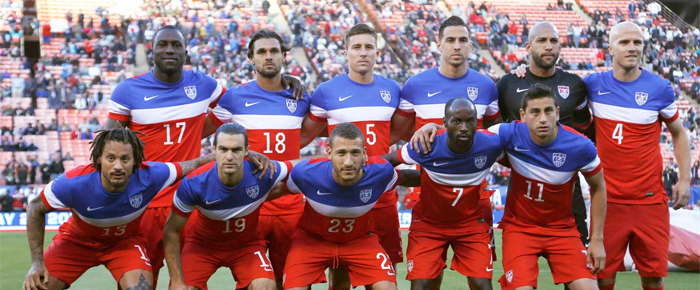
By Flint Wheeler
Ratings for the one match between USA vs Portugal equaled that of the NBA Finals and World Series. While soccer may not have surpassed our national pastime as the go-to third sport option. If I were major league baseball, I’d be trying real hard to be relevant right about now. It’s pretty easy to say that the World Cup has already become our new Summer Olympics.
The game may have been a tie, but ESPN definitely won: ESPN’s telecast of Sunday’s United States vs. Portugal match during the 2014 FIFA World Cup set an all-time viewership record. The match averaged 18.2 million viewers, surpassing a previous high set back in 1999 for the Women’s World Cup final (USA vs. China) on ABC. The game (which concluded with a 2-2 tie) peaked with 23 million viewers at one point.
This marked ESPN’s most-viewed non-football telecast ever and actually the second record-setting World Cup telecast recently. The first 2014 FIFA World Cup match involving the United States (a 2-1 victory over Ghana) averaged 11.1 million viewers — the most-watched men’s soccer match on ESPN at the time.
Plus, here’s the latest big-picture data for the “Americans do/do not watch soccer” debate: The 2006 World Cup coverage on ESPN, ESPN2 and ABC combined to average 2 million viewers in 2006, then 2.9 million in 2010 and now 4.3 million in 2014.
The United States’ mostly inspired—and occasionally soul-crushing—group play in the World Cup this year has garnered record-breaking ratings. Our first match, a victory over Ghana, was the most-watched soccer game ever on ESPN. That is , of course until the U.S. vs Portugal match crushed those opening numbers as detailed above.
Does America finally love soccer?
No. Or, more specifically: No, there isn’t yet much evidence that rapt TV audiences from the World Cup will keep watching soccer between quadrennial worldwide championships. Soccer isn’t becoming America’s new baseball. The World Cup is becoming America’s new Summer Olympics.
World Cup ratings have steadily grown since 2006. The only argument to be made is that we actually forget about soccer in between World Cup’s and then every four years treat it like a new puppy.
The soccer evangelist says: The World Cup is nearly as popular as the World Series on television. The soccer skeptic says: … and in the 1,400 days between World Cup matches, everybody goes back to not watching soccer on TV.
There is good news for MLS investors and soccer fans. Average stadium attendance is way up in the last few years. Networks are desperate to break out soccer, because the audiences are young, the Hispanic population is growing, and the exclusive rights are dirt cheap compared to the NFL and NBA. But the reality is that nobody is watching American soccer outside the stadium (and few Americans are watching world-class matches in the Premier League on NBC). Here are the ratings for MLS finals in the last two decades. This picture doesn’t really require explanation.
In 2012, 32 million Americans watched Usain Bolt win the 100-meter race. It wasn’t a reflection of racing’s emergence as a major TV destination. It was a reflection that the Summer Olympics are a special glimpse of rare global talent that air when America’s most popular sports, the NFL and NBA, are dormant.
The World Cup is essentially a single-sport Summer Olympics introducing tens of millions of viewers to a thrilling contest in a sport they typically don’t care about. Unfortunately for America’s soccer fans, the vast majority of yesterday’s domestic viewers won’t watch another soccer game between August and 2018. With MLS growing in popularity and from what I’ve see a ‘cool’ factor of being at a soccer event, my prediction is slowly but surely the big three will be the NFL, NBA & MLS. It may already have.













































